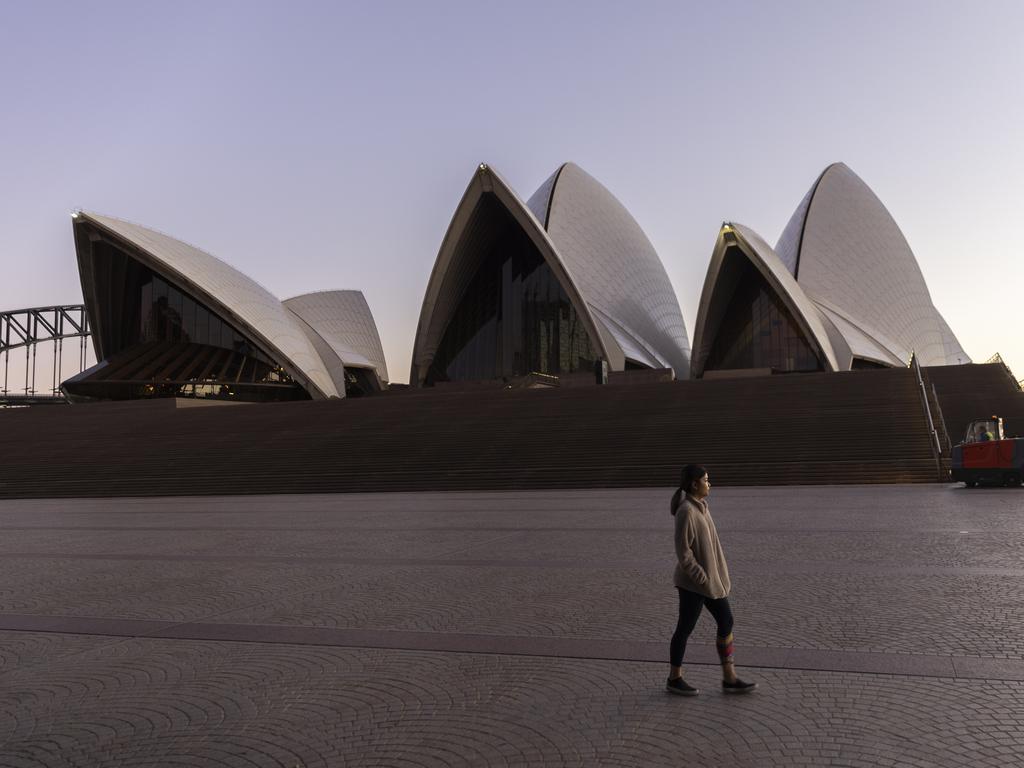Emergency Covid meeting as states scramble
Scott Morrison will call an emergency national cabinet meeting to deal with growing Covid-19 outbreaks across the country.

Scott Morrison will call an emergency national cabinet meeting to deal with growing Covid-19 outbreaks across the country as states close borders after new cases emerged in Sydney, Brisbane, Perth and Darwin.
The Northern Territory was the latest jurisdiction to call a snap two-day lockdown covering Darwin and surrounding regions, with four cases linked to a mine in the Tanami Desert that could have exposed hundreds of workers.
At least 35 cases of community transmission were identified across four states on Sunday, the majority located in NSW, where officials said exposures would rise substantially because symptoms sometimes emerged days after contracting the virus.
The Prime Minister will discuss the growing outbreak with key cabinet ministers – including Josh Frydenberg, Deputy Prime Minister Barnaby Joyce and Defence Minister Peter Dutton – on Monday and will seek an urgent meeting of state and territory leaders in coming days.
Western Australia on Sunday afternoon closed its borders to Queensland and the NT while South Australia has strict travel restrictions on every state except Tasmania. NSW Premier Gladys Berejiklian on Saturday announced a Sydney-wide lockdown, which is expected to stay in place until at least early July.
Health officials in Sydney said they had identified 30 new cases overnight, 19 of them patients who had moved freely through the community for days while asymptomatic. About 100 cases have been identified across more than 240 exposure sites in Sydney, with one person receiving treatment in an intensive care unit.
All of these cases – bar two – have been linked to each other, with the state’s chief health officer Kerry Chant saying contact tracing teams were not being overwhelmed in their efforts to chase down the virus.
As the rest of the country scrambled to introduce border closures and tighter restrictions, figures released by the commonwealth showed nearly 70,000 vaccines had been administered over the previous 24 hours.
Lengthy queues emerged outside some vaccination centres in Sydney, where 12,881 doses were delivered in 24 hours. About 28 per cent of eligible Australians have received their first doses of AstraZeneca or Pfizer.
The Australian understands the Australian Technical Advisory Group on Immunisation is unlikely to change its current advice relating to the AstraZeneca vaccine when it reconvenes this week; it ruled in June that the Pfizer vaccine was preferred for people under the age of 60 due to a rare blood-clotting syndrome.
As discussions turned to boosting inoculation numbers as a pathway towards living with the virus, state and territory leaders took drastic action.
WA Premier Mark McGowan on Sunday reintroduced mask requirements and crowd limits after a returned traveller from Sydney tested positive to the virus. The infected person, a physiotherapist who had spent time at an exposed cafe in Sydney’s Bondi Beach, had originally tested negative on arrival in WA but was retested on the weekend after developing symptoms. She had received the first dose of the AstraZeneca vaccine, officials said.
In announcing the restrictions, WA Health Minister Roger Cook said there was likely to be a “significant” number of casual contacts linked to the case. “These are very proactive, deliberate and aggressive responses to a potential threat to the Western Australian community,” he said.
NT Chief Minister Michael Gunner described the situation as the biggest Covid-19 threat the Territory had faced.
Queensland also reintroduced restrictions on the number of people in hospitality venues and capped the permitted number of people at private gatherings to 100 after its health authorities identified 26 locations of concern in inner-city Brisbane linked to three cases, one of whom was a mine worker from the same NT goldmine. The worker was infectious in the community for about a day, Queensland Health said.
ACT officials introduced mask requirements despite the territory not recording any active cases. Asked if the nation was on the brink of a national outbreak, Health Minister Greg Hunt said the federal government ultimately had confidence in the systems put in place by state and territory leaders. “Every case is of concern but what I am focused on is making sure we have the testing, tracing and appropriate distancing in place around the country,” he said.
“We are, in my view, better placed than virtually every other country in the world to manage outbreaks. We have done it before and we will do it again and we will get through it.”
In NSW, officials began on Sunday to draft a financial assistance package for devastated businesses and industries expected to lose significant revenues.
NSW Treasurer Dominic Perrottet is expected to announce a fresh tranche of financial support for the hospitality sector – partly targeted at catering businesses who have been left facing hefty bills for cancelled events – as well as business support grants for restaurants and cafes.
The details are expected to be outlined on either Monday or Tuesday once they are formally approved by the government’s expenditure review committee.
The NSW hospitality industry accounts for roughly 34 per cent of the national market, with each week of lockdown costing it roughly $228m in lost revenue and $70m in lost sales for suppliers.
Ms Berejiklian repeated her call on Sunday for more vaccine doses to be provided to NSW, saying people were waiting and willing to accept them.
“Whenever we get doses, we get them in arms,” she said.








To join the conversation, please log in. Don't have an account? Register
Join the conversation, you are commenting as Logout